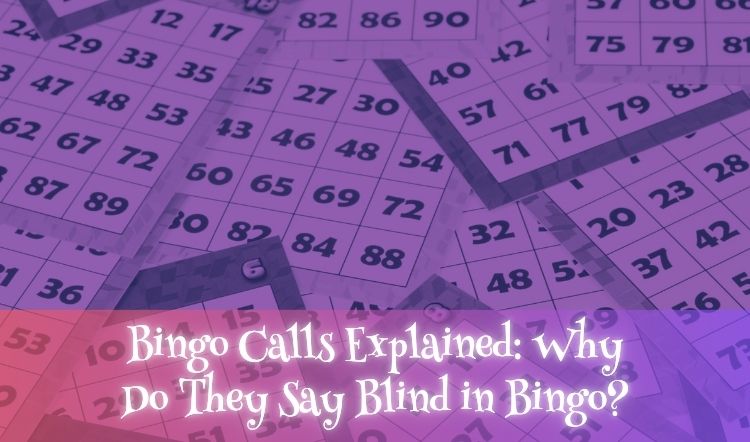
Bingo halls and online games across the UK are filled with quirky nicknames for numbers, and the word “blind” pops up quite a bit. You might have heard people calling out “one blind 20” or “two blind 22” and wondered what it actually means.
These bingo calls can sound a bit strange if you’re new to the game or just tuning in to your local club’s lingo. They’re a big part of what might makes a bingo session feel lively and fun.
Curious about where terms like “blind” come from and why people use them during play? Stick around as this article clears up the meaning behind these unique calls, and how they fit into the wider bingo tradition.
What Does “Blind” Mean in Bingo?
If you hear the word “blind” in bingo, it simply points to numbers between 10 and 90 that end with zero. For example, “one blind 20” means 20 and “six blind 60” means 60. The word “blind” highlights the zero at the end so these round numbers are not mistaken for others.
Callers began using this term to make things clearer in busy bingo halls, where sound can carry and numbers easily blur together. Without the extra cue, 20 might sound like 2 or even 22, especially if there is background noise. Adding “blind” keeps the pace brisk while cutting down on confusion.
Online bingo often presents numbers on-screen, so you may see fewer traditional calls, or a more streamlined style. Each platform has its own approach, and many include a help section that explains how numbers are shown and whether classic calls are used.
If you do decide to try your hand at bingo, remember to do so responsibly and within your means; never wager more than you can afford to lose.
Where Did the Phrase “Blind” in Bingo Come From?
The word “blind” has been part of bingo lingo for decades. It likely grew out of practical needs in large, chatty halls, where callers needed a neat way to signal that a number ended in zero. Short prompts were essential. They cut through the noise and made it easier for players to keep up.
As bingo grew in popularity across the UK, halls varied in size, acoustics, and regional accents. Simple, distinctive calls helped keep everyone on the same page. “Blind” became one of those time-saving cues that was quick to say and easy to recognise, which is why it has stuck around even as the game moved online.
How Are Bingo Calls Chosen and Why Do They Matter?
Bingo calls are designed to make each number stand out. Many use rhymes, shapes, or familiar sayings to help players recognise what has just been called. The clearer the call, the smoother the game, especially when people are marking numbers quickly.
Some calls have become part of shared culture because they are catchy or easy to remember, like “two little ducks” for 22. Others are more functional. Their job is to cut through the noise and make sure no one confuses a number during a fast round.
Common “Blind” Calls and Their Meanings
Bingo has a collection of memorable phrases that callers use to announce numbers. These calls often mix rhymes, puns, or old sayings with the numbers themselves, which helps players hear and mark them without hesitation.
One Little Duck and Other Classic Calls
Some numbers have gained quirky nicknames that players across the UK will recognise. “One little duck” for 2 comes from the shape of the number. “Legs eleven” for 11 is another long-standing favourite. You may also hear alternative modern takes for a few traditional lines that venues choose to update for their audiences. Together, these calls create a familiar, friendly rhythm that many players enjoy.
How “Blind” Fits into Bingo’s Traditional Rhymes
“Blind” calls work a bit differently. They keep things direct by signalling numbers that end in zero, such as “four blind 40” or “eight blind 80”. The purpose is straightforward: make round numbers clear so they are not mistaken for single digits or similar-sounding calls.
Because they prioritise clarity, “blind” calls are usually simple rather than playful. That makes them especially useful in fast games or echoing rooms, and they translate neatly to online formats where speed and accuracy matter.
Play Bingo Online At Wizard Slots
If you enjoy classic calls or want to hear how “blind” numbers sound in a modern setting, explore the bingo rooms at Wizard Slots. There is a selection of game styles and ticket prices, from traditional 90-ball bingo to quicker formats, with clear details on prizes and start times shown in the lobby.
Wizard Slots is licensed and regulated by the UK Gambling Commission (UKGC), and game information is presented clearly so you can see how each room works at a glance. Whether you prefer scheduled sessions or quicker games, the bingo lobby makes it simple to find something that suits your pace.
Feel free to register and browse the room, then check the help section for how calls are presented in each game. Tools to set limits and find support are built in, so you can manage your play in line with your preferences and budget while you play.
If you are ready to hear those calls for yourself, then why not join us at Wizard Slots and see how the classics and the “blind” numbers come together in play. Always keep responsible gambling practises in mind.
**The information provided in this blog is intended for educational purposes and should not be construed as betting advice or a guarantee of success. Always gamble responsibly.
*All values (Bet Levels, Maximum Wins etc.) mentioned in relation to these games are subject to change at any time. Game features mentioned may not be available in some jurisdictions.
